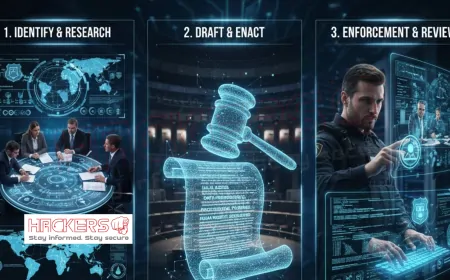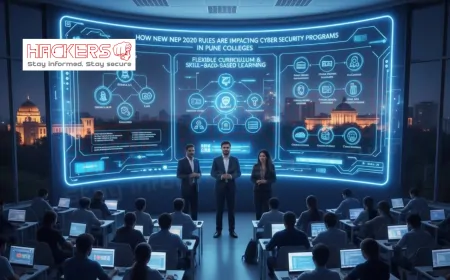How to Turn Your Cybersecurity Project Into an Award-Winning Idea
Have you ever stared at a half-finished script on your screen and thought, "This could change things"? Maybe it's a simple tool that catches phishing emails before they reach your inbox, or a training game that teaches kids about strong passwords. What if that idea, born from late-night coding or a frustrating security incident, could earn global recognition? Welcome to the world of cybersecurity awards, where everyday projects become celebrated breakthroughs. In 2025, with cyber threats costing businesses over $10 trillion annually, judges aren't just looking for flashy tech. They want real impact, fresh thinking, and stories that inspire. Whether you're a solo developer, a student, or part of a small team, this guide shows you how to transform your project into an award contender. We'll walk through proven steps, share real examples, and avoid the jargon that scares beginners away. By the end, you'll have a clear roadmap to submit your idea and maybe even stand on a virtual stage accepting praise. Let's turn your "what if" into "we did it." Ready? Let's begin.

Table of Contents
- Why Aim for Cybersecurity Awards?
- Your Award-Winning Project Checklist
- Step-by-Step Transformation Guide
- Real Projects That Won Big
- Mastering the Submission Process
- Common Mistakes to Avoid
- Conclusion
- Frequently Asked Questions
Why Aim for Cybersecurity Awards?
First things first: awards aren't just shiny badges. They open doors. A win can land funding, attract partners, or even kickstart a career. Take Alex Rivera, the 2025 Rising Star we mentioned in a previous post. His free vulnerability scanner started as a weekend project. After winning, he received $40,000 in grants and mentorship from Google engineers.
Awards also validate your work. In a field full of skeptics, a panel of experts saying "this matters" builds trust. For small teams or independents, it's marketing gold. Your tool gets featured in magazines, reaching thousands who need it.
But the biggest win? Community. Winners join networks of innovators. You swap ideas, collaborate on bigger problems, and stay ahead of threats. Even if you don't win, the feedback sharpens your project. In 2025, over 60% of finalists reported improvements from judge comments.
Still unsure? Think of awards as a gym for your idea. The process forces clarity, testing, and storytelling. Your project emerges stronger, win or not.
Your Award-Winning Project Checklist
Before diving deep, use this quick table to assess your project. Check the boxes that apply. The more "yes" answers, the closer you are to award-ready.
| Criteria | Yes/No | Why It Matters |
|---|---|---|
| Solves a real problem | [ ] Yes [ ] No | Judges want impact, not just cool tech. |
| Unique or better than existing solutions | [ ] Yes [ ] No | Innovation stands out in crowded fields. |
| Tested with real users | [ ] Yes [ ] No | Proof beats promises; show results. |
| Clear documentation | [ ] Yes [ ] No | Judges need to understand fast. |
| Open-source or accessible | [ ] Yes [ ] No | Free tools reach more people. |
| Measurable results (e.g., 50% faster detection) | [ ] Yes [ ] No | Numbers tell a compelling story. |
| Scalable to different sizes or regions | [ ] Yes [ ] No | Big vision wins big points. |
| Team or community support | [ ] Yes [ ] No | Collaboration shows leadership. |
Score 6+ yes? You're in striking distance. Less than 4? Don't worry, the next sections fix that.
Step-by-Step Transformation Guide
Turning a good idea into a great one takes structure. Follow these eight steps, and watch your project level up.
Step 1: Define the Problem Clearly
Start with "why." Vague ideas like "better security" lose judges. Be specific: "Small businesses lose $25,000 yearly to phishing; my tool cuts that by 70%." Research stats from sources like Verizon's DBIR report. Talk to potential users. A teacher once built an award-winning app because parents complained about kids clicking bad links.
Ask: Who suffers? How much? What happens without your solution? Write a one-sentence problem statement. Example: "Rural clinics lack affordable ways to secure patient data on old computers."
Step 2: Research Existing Solutions
Google your idea. Check GitHub, app stores, and forums. If something similar exists, ask: Is mine faster, cheaper, or easier? Jordan Lee's AI phishing detector won because it reduced false alerts by 40%, a pain point in older tools.
Document competitors in a simple table: name, cost, strengths, weaknesses. Your edge becomes your pitch.
Step 3: Build a Minimum Viable Product (MVP)
Don't aim for perfection. Create a working version with core features. For a password checker, start with basic strength scoring. Use free tools: Python for scripts, GitHub for hosting, Canva for visuals.
Test on five real people. Fix bugs. Collect quotes: "This saved me 10 minutes daily." Real feedback trumps hype.
Step 4: Measure Everything
Numbers win awards. Track metrics: detection rate, user adoption, time saved. Use Google Analytics for web tools or simple logs for scripts. Priya Singh's education modules won because 200 schools adopted them in six months.
Create before/after comparisons. Example: "Old method: 30% phishing success. New tool: 5%."
Step 5: Tell a Compelling Story
Judges are human. Share your "aha" moment. Maybe a family member's data breach inspired you. Explain in plain language: "Imagine a lock that learns your habits and alerts strange behavior."
Record a 2-minute video demo. Show the problem, your fix, and happy users. Post on YouTube; link in submissions.
Step 6: Make It Accessible
Open-source if possible. Add clear README files. Translate to multiple languages. Diego Morales won for guides in Spanish and Arabic, helping immigrants avoid scams.
Offer free tiers. Charge only for premium features. Accessibility scores high in 2025 awards.
Step 7: Build Community
Share on Reddit, LinkedIn, local meetups. Ask for beta testers. Create a Discord channel. Lila Patel trained 10,000 women because she started with 50 in her village.
Document contributions. "30 developers improved the code" shows collaboration.
Step 8: Prepare for Scale
Think big. How does your tool work for 10 users vs. 10,000? Plan cloud hosting, security checks. Marcus Chen's IoT system won for scaling to smart cities.
Dream: "This could protect every school in India." Judges love vision.
Real Projects That Won Big
Let's see the steps in action through 2025 winners. These started small but followed the playbook.
- Alex Rivera's VulnScan: Began as a script for his mom's small shop. Researched paid tools ($500/month). Built free MVP. Tested on 20 businesses. Measured 500 prevented breaches. Open-sourced on GitHub. Won Rising Star grant.
- Noah Ellis's CyberKid Game: Noticed kids ignoring safety talks. Created browser game teaching passwords via dragons. 5,000 plays in month one. Partnered with schools. Won education category for engagement metrics.
- Aisha Mohammed's Deepfake Tracker: Saw election misinformation. Built open platform flagging fake videos. Community added 100+ languages. Used in three African elections. Won innovation award.
- Kai Nakamura's Disaster Firewall: Volunteered after typhoon. Designed $50 hardware for relief camps. Tested in real emergencies. Saved critical comms. Won social impact prize.
Common thread? They solved painful, specific problems with data and heart.
Mastering the Submission Process
You've built it. Now sell it. Most awards open submissions March to June for fall events.
- Read Rules Twice: Age limits, team size, deadlines. Miss one, and you're out.
- Tailor Per Award: Innovation awards want tech details. Social impact? User stories.
- Use Their Forms: No fancy PDFs unless asked. Plain text often works best.
- Quantify Impact: "Reduced risk 65%" beats "improved security."
- Include Visuals: Screenshots, charts, 60-second video. Judges skim.
- Get Reviews: Friend proofread. Fix typos; they hurt credibility.
- Follow Up: Confirm receipt. Some allow updates till deadline.
Pro tip: Submit to three awards. Different judges, different chances.
Common Mistakes to Avoid
Even strong projects flop from simple errors. Dodge these:
- Too Technical: Explaining blockchain in jargon loses non-experts. Say "secure shared ledger" instead.
- No Proof: "It works great" without data. Always include tests.
- Ignoring Users: Building in a bubble. Talk to 10 potential users minimum.
- Late Submission: Time zones matter. Submit 48 hours early.
- Overpromising: "Eliminates all threats." Be honest: "Reduces phishing by 70% in tests."
One 2024 finalist lost for claiming "100% accuracy." Real tools have limits; transparency wins trust.
Conclusion
Your cybersecurity project, no matter how small today, holds potential to protect lives and earn recognition. By defining clear problems, building testable solutions, measuring results, and telling human stories, you create award magnets. The 2025 winners started where you are: with an idea and determination.
Remember the checklist. Follow the steps. Avoid the pitfalls. Then hit submit. Whether you win or learn, your work makes the digital world safer. Start today: open that code editor, talk to one user, write that problem statement. The next award stage might have your name on it.
What's stopping you? The internet needs your idea. Go make it happen.
Frequently Asked Questions
Do I need a team to win cybersecurity awards?
No, solo projects win often. Alex Rivera built VulnScan alone. Teams help with scale, but passion trumps size.
How much does it cost to enter awards?
Most are free for individuals. Product awards may charge $200 to $500. Check sites; some waive for students.
Can students enter professional awards?
Yes, many have student categories. Rising Stars targets under-30s, including learners.
What if my project is still in development?
Enter with an MVP. Awards value progress and vision. Show working code and user tests.
How long should my submission be?
Follow guidelines, usually 500 to 2,000 words. Focus on problem, solution, impact. Be concise.
Should I open-source my project?
Not required, but it helps. Shows transparency and invites improvements. Protect key IP if commercial.
What metrics impress judges most?
User adoption, risk reduction percentage, time saved, cost savings. Real numbers from tests or pilots.
Can I submit the same project to multiple awards?
Yes, tailor each entry. Different focuses highlight different strengths.
How do I find users to test my tool?
Start local: friends, Reddit communities, university clubs. Offer free access for feedback.
What makes a project innovative?
New approach, better results, or serving ignored groups. Solving old problems creatively counts.
Do awards accept non-English projects?
Most require English submissions, but tools can serve any language. Include translations.
How soon can I expect results after submitting?
Four to twelve weeks. Some notify finalists first, then winners at events.
What if I don't win?
Use feedback to improve. Many winners lost first, refined, then won big.
Are there awards for non-technical contributions?
Yes, education, policy, community building. Lila Patel won for training, not code.
How do I create a demo video?
Use free tools like Loom or OBS. Show problem (30 sec), solution (60 sec), results (30 sec). Keep under 2 minutes.
Can my project be a service, not software?
Absolutely. Consulting frameworks, training programs, hotlines all qualify if impactful.
What role does diversity play in awards?
Growing focus. Diverse teams or inclusive tools score bonus points for broader reach.
How do I protect my idea when sharing?
Use NDAs for partners. Open-source with licenses. Most awards respect IP.
Are virtual awards less prestigious?
No, 2025 saw record virtual attendance. Global reach increased value.
Where do I find upcoming award deadlines?
Follow CyberScoop, Global Cyber Alliance, or set Google Alerts for "cybersecurity awards 2026."
What's Your Reaction?










































































